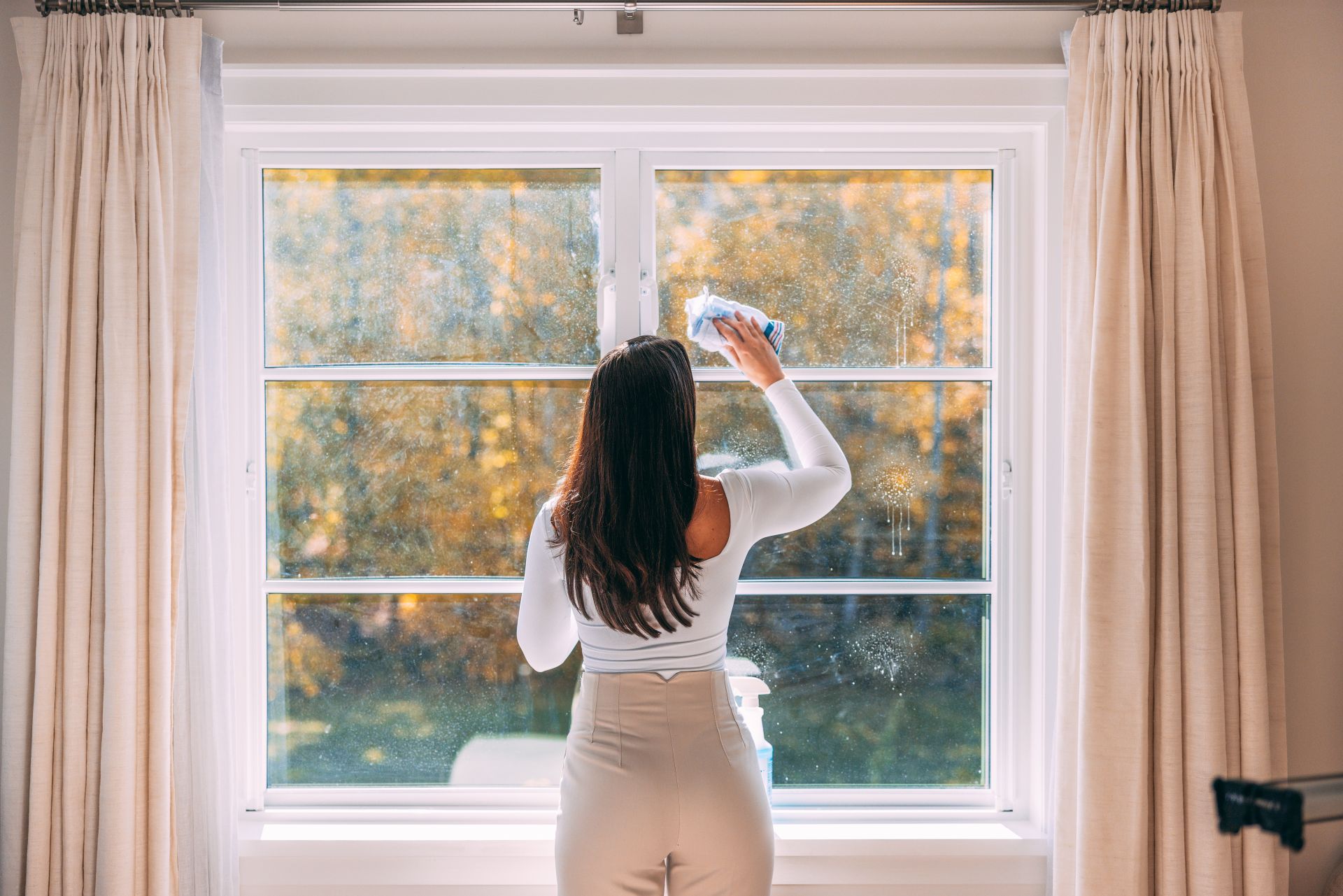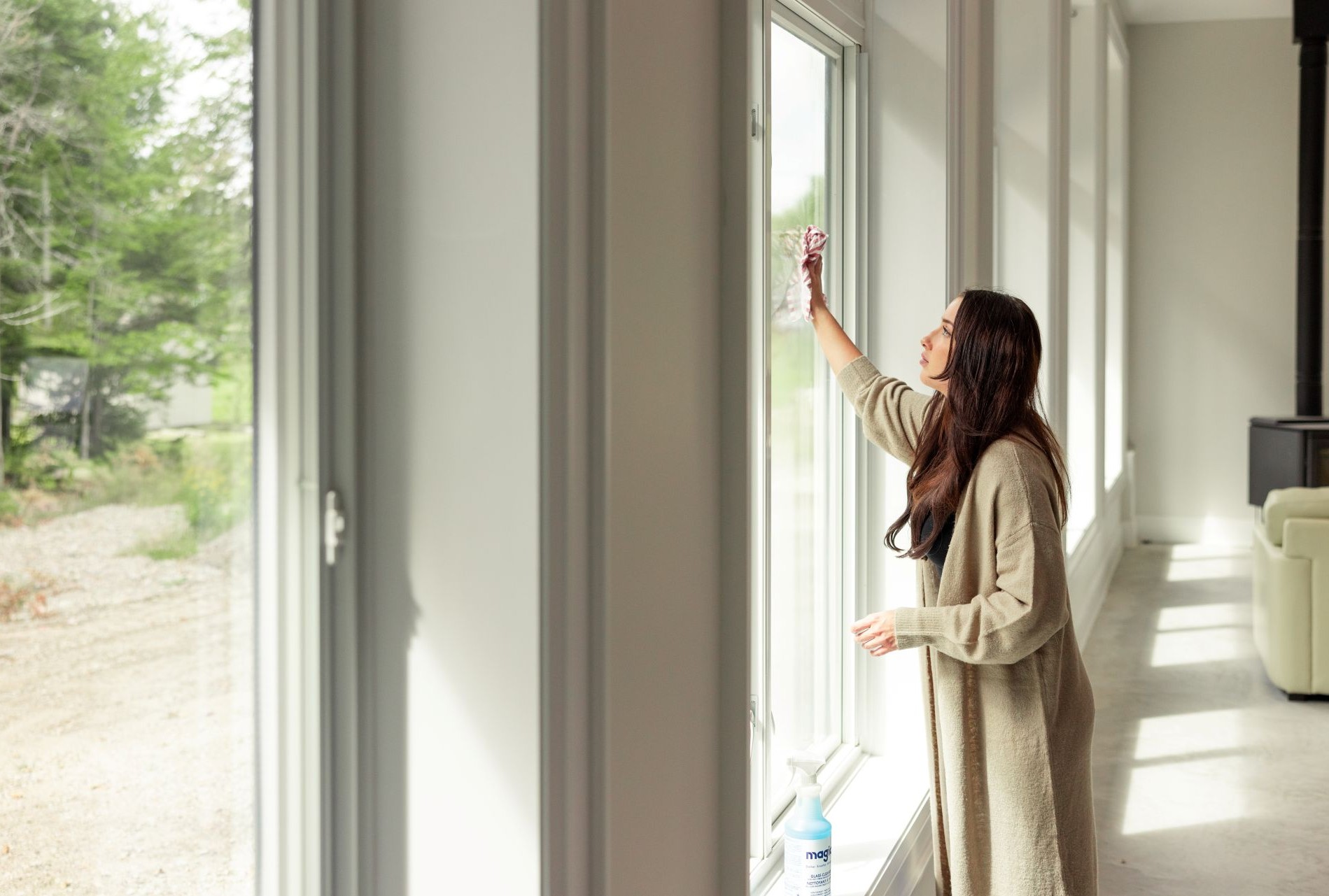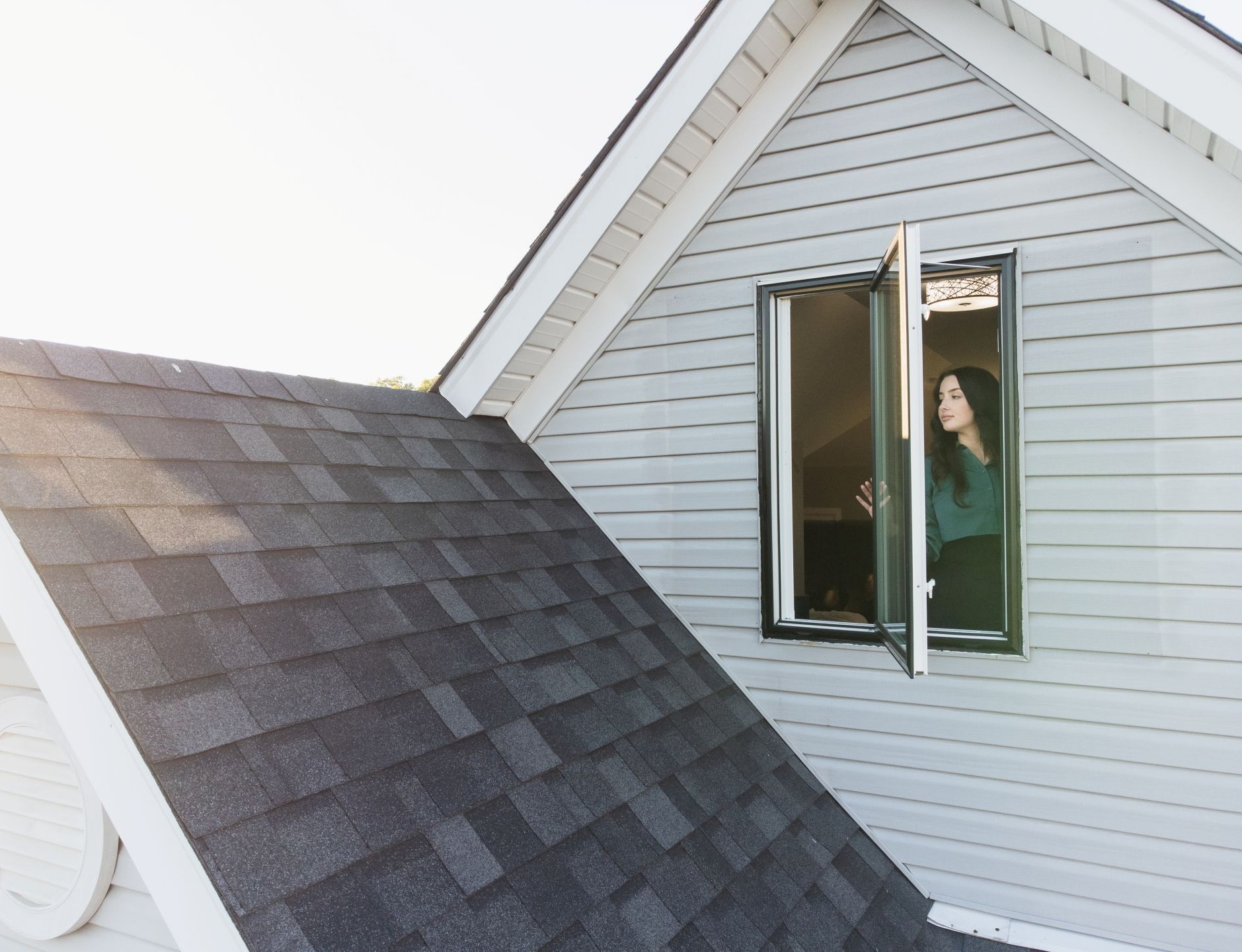
Window Cleaning
The BEST Homemade Window Cleaner Recipes!
While commercial window cleaners are undoubtedly effective, they also contain harsh chemicals; no wonder you're trying to avoid them! Luckily, there are plenty of homemade window cleaner recipes you can try to enjoy crystal-clear glass again, both on interior and exterior windows, as well as on other glass surfaces!
As such, if you want to learn more about making a DIY glass cleaner, read on!
Key Takeaways
- You can create your own homemade window cleaner using ingredients like vinegar, rubbing alcohol, distilled water, and dish soap. They can be combined differently for a streak-free finish and grease removal.
- It's important to take into consideration safety precautions when storing and using your homemade cleaner, including labeling bottles, avoiding metal containers with acidic ingredients, and never mixing solutions that can release toxic fumes.
- Magic windows and glass doors simplify window maintenance thanks to our patented sliding and pivoting technology, self-shedding Zytel track system, and retractable screens, allowing homeowners to clean both sides of the glass safely and easily from inside the home.
Ingredients You'll Need for a DIY Window Cleaner

Here are the pantry staples you'll need to create the best homemade window cleaner that works well on both windows and other glass surfaces, such as bathroom mirrors (with some details explaining why each ingredient is useful):
- Distilled white vinegar: its effectiveness in removing dirt and grime lies in its acetic acid content, which acts as a robust cleaning agent. Furthermore, white vinegar not only helps in achieving streak-free windows but also kills some bacteria when cleaning glass. However, keep in mind that you must be careful when using white vinegar on windows, as it can damage some window surfaces. Alternatively, you can use lemon juice, which has similar properties.
- Rubbing alcohol (better than isopropyl alcohol): it is a powerful solvent and evaporates quickly, which ensures your windows dry quickly and have no streaks. Rubbing alcohol also acts as a disinfectant, adding an extra layer of cleanliness to your windows.
- Distilled water: unlike tap water, distilled water doesn't have mineral deposits that can leave hard water stains on the glass surface. Furthermore, tap water is alkaline, so it can limit the effectiveness of other ingredients.
- Dish soap: it breaks down grease and oil, so it's perfect for windows, especially kitchen or bathroom windows. Additionally, mild dish soap can remove leftover wax from previous cleanings. It can also add a pleasant fragrance.
- Cornstarch: it is a mild abrasive that can remove dirt build-up. However, it needs to be rinsed off thoroughly as it can leave residue.
- Essential oils: these are optional but can mask the strong odor of vinegar and add antimicrobial benefits.
How to Make Your Own Window Cleaner
With the right ingredients and a bit of know-how, you can create a window cleaning solution that’s both effective and economical! Below, we'll provide several recipes for making homemade cleaners for windows. However, before we start, keep these in mind:
- Never mix vinegar with bleach or ammonia. This creates toxic fumes.
- Avoid storing DIY cleaners in reused containers that previously held chemicals, as there may still be residual chemicals that can lead to toxic reactions.
- Don't store anything with fresh lemon juice for more than 1-2 weeks unless refrigerated.
Vinegar-Based Window Cleaner
- Pour 1/4 cup of vinegar and 2 cups of water into a spray bottle. Add a few drops of essential oil if needed.
- Shake well before each use.
- Spray onto the window panes and wipe with a lint-free cleaning cloth or newspaper.
Alternatively, you can use a vinegar+dish soap cleaner, which is definitely the best window cleaner for greasy windows:
- Mix 1/4 cup of white vinegar, 2 cups of water, and 2 tablespoons of liquid dish soap in a spray bottle. Add a few drops of essential oil if needed.
- Shake gently to mix the ingredients.
- Spray on windows and wipe with a clean microfiber cloth.
- For very dirty windows, let it sit for 1-2 minutes before wiping.
Lemon Juice-Based Window Cleaner
- Combine 2 tablespoons of lemon juice, 1 cup of water, and (optional), 1 tablespoon of white vinegar. Add a few drops of essential oil if needed.
- Shake the spray bottle to mix the ingredients.
- Spray directly onto the window and wipe with a clean cloth or squeegee.
You can also add cornstarch to this glass cleaner recipe for extra polish as follows:
- Dissolve 2 tablespoons of cornstarch in 1 1/2 cups of warm water. Add a few drops of essential oil if needed.
- Add 2 tablespoons of lemon juice.
- Shake thoroughly before each use, as cornstarch can settle.
- Spray the solution and then wipe windows clean with a microfiber cloth, making sure to remove any cornstarch residue.
Alternatively, you can also use baking soda, but make sure not to scrub too much to avoid scratching the glass.
Rubbing Alcohol-Based Window Cleaner
- Mix 1 cup of water and 1 cup of alcohol. Optionally, add 1 tablespoon of white vinegar. Add a few drops of essential oil if needed.
- Shake well before use.
- Spray onto windows and wipe with a lint-free cloth.
- Buff dry for a streak-free shine.
How to Store Your Homemade Glass Cleaner

You can definitely store homemade solutions just as you would store commercial cleaners. This way, you avoid the hassle of mixing all the ingredients every time you need to wash windows. It's recommended to avoid plastic bottles. Instead, use spray bottles made of glass or high-quality plastic to store window cleaners. Avoid metal containers if you're using vinegar or lemon juice, as they are acidic.
Furthermore, make sure to label the cleaner correctly. Include the ingredients, the date you mixed them, and any special instructions. Store the bottles out of reach of children and pets, preferably away from direct sunlight and heat.
These cleaners can be stored for 6 months and even more, although this depends on the ingredients used. For example, lemon juice-based window cleaners should only be stored for up to 1-2 weeks unless refrigerated. On the other hand, vinegar or rubbing alcohol window cleaners can be stored for up to 6 months.
Tips for Cleaning Windows Effectively
- Use the right tools and materials. Use microfiber cloths or a high-quality squeegee, as these are effective at absorbing moisture and do not leave lint behind. Avoid paper towels, because they can leave residue. You may also need a scraper for grime and a vacuum or brush for frames and screens.
- Choose the best time to clean, preferably on cloudy days or in the morning/afternoon, when it's cooler outside. Direct sunlight causes cleaning solutions to dry too quickly, leaving streaks.
- Prepare the windows. First, remove the screens and clean them separately. Then, dust the window frame, tracks, and window glass thoroughly. Only then apply the cleaning solution to prevent dirt from mixing with the cleaner and causing streaks. You can use a vacuum or soft brush to remove dust, especially from corners.
- Apply the cleaning solution properly. If using a microfiber cloth, spray the solution onto the cloth, not directly onto the glass. This helps avoid oversaturation and potential damage to window frames. Clean the glass using a zig-zag motion from top to bottom, ensuring you cover the entire surface without lifting the cloth. If using a squeegee, spray the solution onto the glass and move the squeegee in overlapping lines from top to bottom. Repeat if necessary for heavily soiled windows.
- Buff for a streak-free finish. Immediately after cleaning, buff the glass with a dry, lint-free microfiber cloth using quick, light motions to remove any remaining streaks or moisture.
- Don’t forget the screens and window treatments. Vacuum screens with an upholstery brush attachment. Use warm water and mild detergent for greasy spots. Let the screens dry completely before reinstalling. Furthermore, clean window treatments (curtains, blinds) according to the manufacturer’s instructions to prevent dust from transferring to clean windows.
Tired of Climbing Ladders to Clean Windows? Contact Magic!
When it comes to window and door upgrades, Magic windows and glass doors offer more than just a sleek design! They’re built with innovative technology that makes cleaning and maintenance significantly easier for homeowners. Why? Let's find out!
Unique Opening Technology for Effortless Cleaning

One of the standout features of Magic products is our patented sliding and pivoting system. Unlike traditional windows that open on hinges and use cranks, Magic windows slide seamlessly along a track, giving you unrestricted access to both sides of the glass from the inside of your home. This makes cleaning outside windows on upper floors or hard-to-reach areas safe and hassle-free: no ladders, no leaning out, no risk!
Our glass doors operate with the same hardware technology. Plus, the multi-panel configurations allow the panels to slide smoothly and stack neatly, exposing more surface area and reducing grime buildup that commonly occurs in typical door frames.
Designed for Cleanliness
Thanks to our patented Parallex hardware, Magic windows and doors are basically maintenance-free. First, they lack hinges. Secondly, they feature the Zytel track made of a unique composite material that molecularly sheds itself at a granular level. This means that it requires virtually no maintenance and even becomes easier to use over time!
Furthermore, Magic screens and blinds are fully retractable. This means they can stay hidden when needed (when you cook, for example, and want to prevent grease and grime build-up on screens).
Curious to learn more about Magic products? Give us a call at 1866-OK-MAGIC!
Frequently Asked Questions
What is the best homemade product for cleaning windows?
A mix of 1/4 cup of vinegar and 2 cups of water is one of the most effective and natural homemade window cleaners for removing grime and achieving a clear finish.
How do you make streak-free glass cleaner?
To make a streak-free glass cleaner, combine 1 cup rubbing alcohol, 1 cup water, and 1 tablespoon white vinegar in a spray bottle; this formula evaporates quickly and leaves glass streak-free.
Is vinegar and Dawn good for cleaning windows?
Vinegar and Dawn dish soap make a powerful combo that cuts through grease and dirt, especially on very dirty or outdoor windows. Just rinse thoroughly to avoid streaks.
What is the best homemade windshield cleaner?
The best homemade windshield cleaner is a mix of 1 cup distilled water, 1 cup rubbing alcohol, and 1-2 tablespoons white vinegar.
Can I use regular tap water instead of distilled water in the cleaning solution?
It's best to use distilled water for your cleaning solution to prevent any streaks or mineral deposits that tap water might leave behind.
How often should I clean my windows?
You should clean your windows every two to three months to keep them clear and free from grime build-up.
Is it safe to use homemade window cleaners on tinted windows?
Yes, it’s generally safe to use your own cleaners made at home on tinted windows, but be cautious with rubbing alcohol, as too much can damage the tint over time.